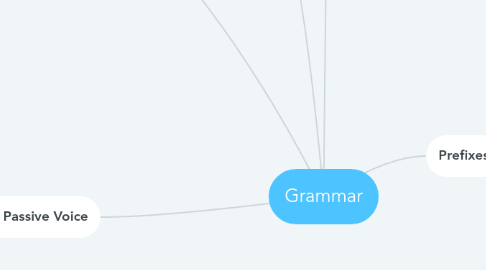
1. Adjectives and Adverbs
1.1. Adjectives
1.1.1. Definition:An adjective is a word to describes a noun or pronoun.
1.1.2. Example
1.1.2.1. that is a quiet place.
1.1.2.2. how can I find my cute dog?
1.1.2.3. there is an old blue car.
1.1.2.4. Why people use adjectives: To build a more colorful sentence.
1.2. Adverbs
1.2.1. Definition:adverb is a word to describes verbs, adjectives, or other adverbs.
1.2.2. Example
1.2.2.1. he walks slowly.
1.2.2.2. I speak very quickly.
1.2.2.3. you did very good.
1.2.3. Why people use adverb: adverb can help people discribe more accuracy.
2. Active Voice and Passive Voice
2.1. Active Voice
2.1.1. Definition: Active voice is the subject performs the action denoted by the verb.
2.1.2. Example
2.1.2.1. I must finish my homework.
2.1.2.2. He eats all food on the table.
2.1.2.3. Jane clean her clothes.
2.1.2.4. Why people use active voice: active voice can make a clear subject.
2.2. Passive Voice
2.2.1. Definition:change the normal word order of many active sentences so that the subject have no active
2.2.2. Example
2.2.2.1. My homework must fishined by me.
2.2.2.2. All food on the table ate by him.
2.2.2.3. Jane's clothes cleand by her.
2.2.2.4. Why people use passive voice: passive voice will strong shows who is the subject.
3. Verb Tenses and Irregular Forms
3.1. Verb tences
3.1.1. Simple tenses
3.1.1.1. Past
3.1.1.1.1. I was a high school student.
3.1.1.2. Present
3.1.1.2.1. I am a unicersity student
3.1.1.3. Future
3.1.1.3.1. I will be a father.
3.1.2. perfect tenses
3.1.2.1. Definition:Perfect tenses used to show actions that are already complete.
3.1.2.2. Example
3.1.2.2.1. I have eaten my breakfest.
3.1.2.2.2. He had changed the color of his clothes.
3.1.2.2.3. I will have finished my housework.
3.1.3. Definition: The past is used to describe things that have already happened. The present tense is used to describe things that are happening right now, or things that are continuous. The future tense describes things that have yet to happen.
3.1.4. Why people use verb tenses: Verb tenses can help people know when the evevnt happen.
3.2. Irregular Forms
3.2.1. Definition: some verb do not follow the rule of verb change.
3.2.2. Example
3.2.2.1. blow blew blown
3.2.2.2. break broke broken
3.2.2.3. breed bred bred
3.2.3. The importance of irregular verbs: people should remember the irregular verb for use it.
4. Articales and prepositions
4.1. Prepositions
4.1.1. Definition:Prepositions are words which begin prepositional phrases.
4.1.2. Example
4.1.2.1. about: the time is about five seconds.
4.1.2.2. below: the set is below to the desk
4.1.2.3. excepting: I can remember every things except my brother.
4.1.3. Why people need preposition
4.1.3.1. It is useful to find the prepositional phrases in sentences
4.2. Articles
4.2.1. Definition:Articles are words that define a noun as specific or unspecific
4.2.2. Example
4.2.2.1. a: here is a student.
4.2.2.2. an: I want to show you an important thing.
4.2.2.3. the: the article told people to be a good person.
4.2.3. Why people need articles: to signal what the word behind the articales
5. Prefixes and Suffixes
5.1. Perfixes
5.1.1. Definition:Prefixes are added to the beginning of a word to create a new word
5.1.2. Example
5.1.2.1. happy-unhappy
5.1.2.2. cultural-multicultural
5.1.2.3. work -overwork
5.1.3. Why people use perfixes: perfixes can make more vocabulary.
5.2. Suffixes
5.2.1. Definition: Suffixes are added to the endding of a word to create a new word
5.2.2. Example
5.2.2.1. child-childish
5.2.2.2. work-worker
5.2.2.3. taste-tasteless
5.2.3. Why people use suffixes: suffixes can make more new vocabulary.

